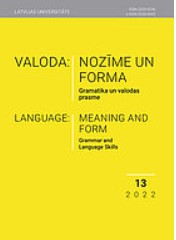Multilingvālais mikslis diasporā: latviešu valoda mijiedarbībā ar vācu valodu
Multilingual language mixing in the diaspora: Latvian in contact with German
Author(s): Sarmīte TrūpaSubject(s): Foreign languages learning, Language acquisition, Sociolinguistics, Baltic Languages
Published by: Latvijas Universitātes Akadēmiskais apgāds
Keywords: diaspora; code-switching; code-mixing; translanguaging; language attitudes; multilingualism;
Summary/Abstract: Drawing on the data from fifteen semi-structured interviews with first-generation Latvian emigrants living in Germany, this article explores language attitudes and linguistic behaviour of the so called Latvian “new diaspora”, which has emerged over the last thirty years since Latvia regained its independence in 1991. In Germany, the number of Latvians has increased rapidly since 2011, when the country opened its labour market for immigrants from the new EU member states, including Latvia. Since then, according to the German Federal Statistical Office, the number of Latvian citizens in Germany has grown steadily reaching nearly 40 000 at the end of 2019. This study explores the attitudes of first-generation Latvians in Germany towards code-switching, code-mixing, and translanguaging and how the interviewees engage in these practices themselves. Language or code alternation is a widespread phenomenon among GRAMATIKA UN VALODAS PRASME 207 the people living in diaspora, because the diasporic community uses at least two languages in everyday life, i.e., native, family resp. home language (= Latvian language) and the dominant community language (= German language). Furthermore, depending on speakers’ age and their exposure to different languages and cultures, code-switching practices among Latvians may in addition involve Russian, English or another language. The findings of this study suggest that among Latvians in Germany, language or code alternation tend to occur in informal interactional context, as it provides speakers with more expression possibilities. Code-switching, on the one hand, is employed as a tool to facilitate smoother communication in an informal multilingual environment and, on the other, often indicates speakers’ good knowledge of languages in use.
Journal: Valoda: nozīme un forma
- Issue Year: 2022
- Issue No: 13
- Page Range: 196-207
- Page Count: 12
- Language: Latvian

